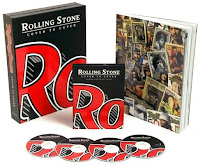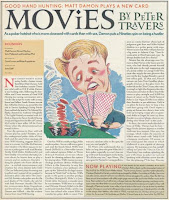Poker & Pop Culture: Rolling Stone (1967-2007) (1 of 2)
 I mentioned last post that my brother gave me this nifty birthday present, a DVD set collecting the first forty years of Rolling Stone magazine. Every page of every issue is scanned and readable on the computer screen, and, of course, one can perform the usual searches (by keywords, date, etc.) to track down that article you remember reading long ago but can’t quite put your finger on today.
I mentioned last post that my brother gave me this nifty birthday present, a DVD set collecting the first forty years of Rolling Stone magazine. Every page of every issue is scanned and readable on the computer screen, and, of course, one can perform the usual searches (by keywords, date, etc.) to track down that article you remember reading long ago but can’t quite put your finger on today.Was curious to see what Rolling Stone might have written about poker over the last forty years (or, to be more precise, between 1967 and 2007). While the magazine obviously focuses on music, it has always provided commentary on other aspects of popular culture, too. I figured simply searching the archives for the word “poker” might reveal a little something about the cultural impact of the game over the last four decades. (If not that, perhaps I’d find some article or two of interest to share with you here.)
The whole exercise made me think of what Kevmath did back in March when Sports Illustrated made their entire archive available online. He searched through and found a number of interesting poker-related articles, then began a 2+2 thread with links to several of them.
My search of Rolling Stone was much, much less fruitful, I’m afraid. In fact, as far as so-called “professional” poker and the WSOP are concerned, neither really existed for Rolling Stone prior to 2005. Well, there was one mention of the WSOP in Peter Travers’ 1998 review of Rounders, but no articles about the event itself until the summer of ’05. That’s right -- it would take two full years after his Main Event triumph for Chris Moneymaker even to be mentioned in RS, and then only in passing.
The generic search for the word “poker” revealed a total of 59 “articles,” although some of these aren’t really articles at all, but simply appearances of the word in the Table of Contents or in blurb-like insets appearing within other articles.
In our analysis, we can toss out several of the references as largely extraneous to whatever conclusions we might want to draw here. For example, three were not to the game at all, but to the metal rod with which one stirs a fire.
There were about fifteen instances in which a person -- usually a musician or actor -- was described as “poker-faced.” The musicians included the Animals, Willie Nelson, the Rolling Stones’ drummer Charlie Watts, Dinosaur Jr. front man J Mascis, and Devo (twice), among others. The actors included John Huston, Dan Akyroyd (in Dragnet), Gary Oldman, and a few other, lesser known folks. (Oh, Stephen Colbert gets the descriptor, too.) There were also references to certain individuals not being “poker-faced,” such as Prince in his video for “Kiss.” Then certain groups, like the Flaming Lips, A Tribe Called Quest, Modest Mouse, were congratulated for their “poker-faced humor.”
That left just under forty actual references to the game of poker, although some of these references were also made simply by way of analogy, such as in a review of the 1993 documentary The War Room, where James Carville is shown playing politics “like a raucous game of high-stakes poker.”
Then there are the movie reviews of films which feature poker, such as Milos Forman’s 1971 film Taking Off in which characters play strip poker. Poker also comes up in the plot synopses of Honeymoon in Vegas (1992), Maverick (1994), Rounders (1998), Dickie Roberts: Former Child Star (2003), The 40-Year Old Virgin (2005), and Casino Royale (2006).
 Travers’ review of Rounders, by the way, is mostly positive, although he did find the film derivative of both The Cincinnati Kid and Good Will Hunting. He likes Matt Damon’s performance as Mike McDermott (he’s “a winner”), calls Ed Norton “riveting,” and finds John Malkovich “over the top.” Travers ultimately characterizes the film as “stylish entertainment and smartass fun,” pointing out that it limits itself somewhat because it does become a “crowd pleaser” (“the movie stacks the deck in favor of Mike”).
Travers’ review of Rounders, by the way, is mostly positive, although he did find the film derivative of both The Cincinnati Kid and Good Will Hunting. He likes Matt Damon’s performance as Mike McDermott (he’s “a winner”), calls Ed Norton “riveting,” and finds John Malkovich “over the top.” Travers ultimately characterizes the film as “stylish entertainment and smartass fun,” pointing out that it limits itself somewhat because it does become a “crowd pleaser” (“the movie stacks the deck in favor of Mike”).That leaves us just two dozen or so references to poker. Again, a couple of these are just incidental, such as an article in which Willie Nelson talks about his ownership of a truck stop in Texas which he jokingly says he won in a poker game (he didn’t).
There are a small number of instances where bands recorded songs about poker which get mentioned in reviews. The Everly Brothers had a song called “Three-Armed Poker-Playing River Rat” on their 1972 album Stories We Could Tell, but the reviewer wasn’t impressed. The Electric Light Orchestra has a song called “Poker” on Face the Music (1972) -- the reviewer likes that one. And in 2007 there was a quick blurb about magician Ricky Jay’s compilation of poker-related songs, Ricky Jay Plays Poker.
When the Beatles came to America in 1964, they played poker with photographer Curt Gunther -- not very well, apparently (Gunther made a couple hundy off the Fab Four). Marty Balin of Jefferson Airplane talks about playing poker during Woodstock. In a late 2004 interview with Kanye West, he talks about his love for video games, then the interviewer strangely asks him “What’s the most money you bet on a poker hand this year?” His answer is he doesn’t play poker, although he did lose a little at blackjack. And a 2001 feature on Jay-Z also tells of his love for the game Guts, described in the article as a “high-stakes poker game that’s all about balls.”
There’s a passing reference to poker in a creepy Stephen King short story that appeared in the magazine in 1984. I remember reading this story when it came out. It starts with a woman accidentally shooting herself in the head, yet weirdly surviving. She goes on to have a bunch of hallucinations and ultimately kill her husband (who, by the way, plays poker) and herself. I reread it and can’t say it strikes me as one of King’s finer moments.
There’s also an article about the rise of online gambling sites from September 1999, although it doesn’t mention online poker at all. (Just a passing reference to video poker.)
That brings us down to just ten or so mentions, although really we are just talking about three different “articles” per se. One involves a pair of articles about college students partying with their professors that appeared in the April 16, 1981 issue. Then there were a series of short pieces appearing in the October 5, 2006 issue about the “Best of Vegas,” several of which mention poker. And in the June 16, 2005 issue there was a feature article about “The Crew” -- that group of young poker players that included Joe Bartholdi, David Smyth, Scott Fischman, Tony Lazar, Brett Jungblut, and Dutch and Robert Boyd. Indeed, in the entire forty-year run, this one four-page article about “The Crew” is easily the most studied look at professional poker that appears in Rolling Stone.
Since this post has already run on to a decent length, I’m going to save the discussion of these latter three pieces for tomorrow. Suffice it to say, my scan of the archives demonstrates Rolling Stone’s ambivalence toward poker fairly unambiguously, I think. Not that we’d necessarily expect a music mag to care much about poker, but it still might be surprising to those who might (rightly or wrongly) think of Stu Ungar as a “rock star” to discover he’s never been mentioned in Rolling Stone a single time.
Labels: *the rumble, Rolling Stone magazine














1 Comments:
I can't express how much I appreciate the fact that you did all this research. I find it fascinating, and as I've mentioned before, finding details of poker from the '70s and '80s is extremely difficult.
No, you didn't find any juicy details in Rolling Stone, but at heart, I'm a scientist. Negative results are an important part of the process.
I don't think I'm expressing this very well. But in all seriousness, I found this entry fascinating, and I really, really, really appreciate research like this.
Post a Comment
<< Home